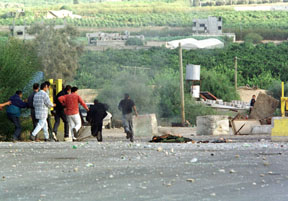|
|
|
Yet in a typical 90-second news story reporting on "Palestinian violence" (as it is routinely called) against Israeli occupation soldiers, viewers are not told that Palestinians are fighting against a military occupation. The right to use force to resist foreign occupation is universally recognized and enshrined in international law. During Iraq's seven-month occupation of Kuwait in 1990-91, TV journalists had little difficulty recognizing this principle. On ABC, Peter Jennings forthrightly referred to the country as "Iraqi-occupied Kuwait." "Tell us about the resistance to the Iraqi occupation," Jennings asked in an interview with a Kuwaiti living under Iraqi rule (World News Tonight, 9/6/90). On CBS, Dan Rather reported that Westerners who had left the emirate "are bringing back stories of an occupied but still unconquered nation" (CBS Evening News, 9/11/90), while his correspondent in the Persian Gulf reported on Kuwaitis who "have vowed to return to resist the Iraqi occupation" and reports of "attacks and ambushes on Iraqi soldiers by a fledgling Kuwaiti resistance" (CBS This Morning, 8/23/90). Yet in the Israeli-occupied territories, CBS correspondents today talk of "Israeli soldiers under daily attack"; Israel...again feeling isolated and under siege"; and, in one case where Israeli occupation troops abandoned a fortified position in the West Bank, "Israelis have surrendered territory to Palestinian violence" (CBS Evening News, 10/4/00, 10/8/00, 10/7/00). About 186 people have died in the conflict so far, at least 170 of them Palestinians killed by Israeli settlers or occupation troops. Some outlets have even taken the step of referring to occupied Palestinian land as part of Israel. Tom Brokaw (NBC Nightly News, 10/2/00) introduced a report about "the ever-widening eruptions of violence in Israel." He then went to NBC correspondent Martin Fletcher, who explained that Palestinians were "storming an Israeli army outpost in Gaza" and "setting siege to another army post in the West Bank." When Israel's internationally uncontested status as an occupying power on Palestinian lands is omitted from the media's coverage, Palestinian rock-throwing is made to look like random aggression, and Israel's use of lethal weaponry can be portrayed as a legitimate response to provocation. The real status of Israel's presence was explained by the United Nations Security Council last month, when it unanimously called upon "Israel, the occupying power, to abide scrupulously by its legal obligations" under the Geneva Conventions to protect human rights in the occupied territories.
|

